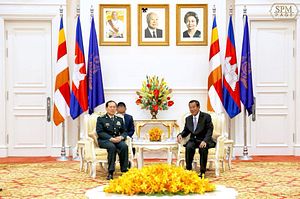Over the weekend, China and Cambodia kicked off the latest iteration of a bilateral military exercise between them in spite of continuing coronavirus fears in both countries and the wider world. The drills demonstrated the growing significance of defense ties between the two countries amid wider domestic and regional dynamics.
Although Cambodia has long had a defense relationship with the security aspect of ties between the two countries has nonetheless come under intensified scrutiny over the past few years amid wider developments, including Cambodia’s tighter embrace of Beijing amid its deteriorating rights record and fears of Chinese military facilities in Cambodia. One of these engagements has been Exercise Golden Dragon, which has expanded from the time it was first held in 2016 from just a few hundred people to thousands of personnel.
This year’s drills were expected to continue a pattern where both countries would look to continue an annual effort to expand the exercise size in terms of troop participation – even though the scope of the exercise remains quite basic and there is much continuity in the areas covered. And while there had been doubts raised about whether drills would be called off due to exacerbating concerns regarding the coronavirus which has hit both countries, both sides had indicated that the they would go on as usual.
Over the weekend, as expected the drills kicked off at Kampot province’s Chumkiri district amid these continuing coronavirus fears. Per Khmer Times, Major General Sokreth Vithyea, the head of the working group in charge of the exercises, confirmed that the drills would continue on as planned until April 1, and that 265 Chinese soldiers and 2,746 Cambodian soldiers are participating in the drills. Separately, The Phnom Penh Post reported on Sunday that defense ministry spokesperson Chhuum Socheat had confirmed that all Chinese soldiers had been checked rigorously for symptoms of the coronavirus before their arrival, including “standard scans and extensive physical tests.”
While the launch of the exercise and the numbers cited are not surprising as they are in line with previous statements we have seen, they are not without significance. As I noted previously, the numbers cited so far – consistent with the “above 3,000” estimate floated before – make this the largest exercise of its kind so far held between the two sides, reflecting what has appeared to be a continued desire to push it to new heights each year to the extent possible in spite of any challenges that they may encounter.
Other than the numbers cited, the rest of the reporting about the exercise thus far suggests more continuity than change. The activities seen thus far, including the inspection of weapons and equipment by RCAF commander-in-chief Vong Pisen and Chinese ambassador to Cambodia Wang Wentian before the drills kicked off, are fairly standard for such drills. The equipment for the exercise, which Sokreth said included six helicopters, nine tanks and 12 APCs and artilleries from Cambodia and six helicopters, nine APCs and other heavy weapons from China, are also not out of the ordinary. And the general areas of focus around counterterrorism and humanitarian assistance and disaster relief are in line with what officials have said previously.
To be sure, the significance of the drills can only fully be assessed after their conclusion. As such, as the drills continue to progress over the course of the next couple weeks, it will continue to be important to watch specific manifestations in order to assess their implications for China-Cambodia relations more broadly.































